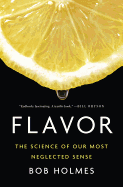
In Flavor: The Science of Our Most Neglected Sense, evolutionary biologist Bob Holmes serves up insightful connections about some strange bedfellows. He pairs subtle aromas of wine, the crunch of fresh Pringles and the nuances of a frozen chicken nugget with the particulars of neuroscience, and the results are a sheer delight.
Holmes quickly admits that he lacks a formal culinary background and is no "supertaster." Yet that makes Flavor all the more digestible; his explanations of technical aspects of taste rely not on foodie or scientific jargon but plain English. Even better, Holmes is as funny as he is enlightening. On taste buds, he writes, "Those mushroom-shaped bumps on the surface of the tongue that most people call taste buds are, technically speaking, really fungiform papillae, an impressive-sounding Latin term that means 'mushroom-shaped bumps.' " He also convincingly compares the human brain to a layer cake.
A broad cast of experts populates Holmes's exploration. He hops between continents visiting conferences, labs and restaurants, meeting with scientists, chefs, researchers and wine growers. All five senses, he learns, shape the perception of flavor, as do genetics, neurobiology, culture and the timing of exposure to new foods. Holmes navigates olfaction research, wades through molecular gastronomy and even braves a taste test of a variety of hot peppers, or as he calls it, a "pursuit of pain." He grants that much about flavor remains to be understood, but as studies on the subject continue, Holmes makes a compelling case that its appreciation is a learnable, worthy pursuit that literally makes sense. --Katie Weed, freelance writer and reviewer

